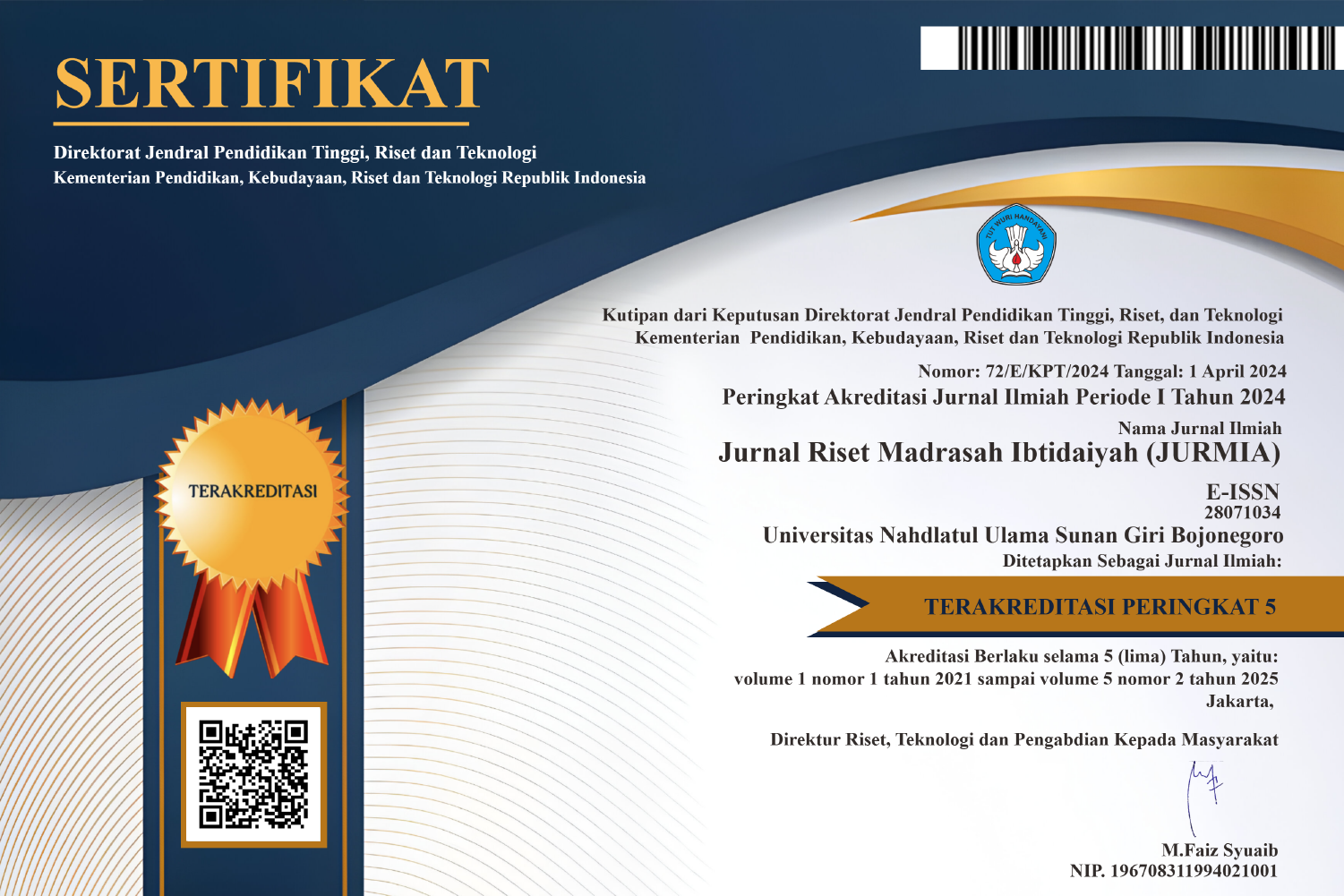Analisis Pengaruh Motivasi Spiritual, Pengendalian Diri dan Sikap Tanggung Jawab terhadap Etos Mengajar serta Implikasinya pada Kebermaknaan Hidup dalam Perspektif Islam

DOI:
https://doi.org/10.32665/jurmia.v2i1.268Keywords:
Spiritual Motivation, Self Control, Responsible Attitude, Teaching Ethics, Meaning of Life, Islamic PerspectiveAbstract
The purpose of this study was to analyze the level of spiritual motivation, self-control, the attitude of responsibility, meaning of life, and teaching ethos, as well as to prove the influence between variables in research, contributions, and predictions of research variables. This study uses a quantitative approach and the respondents are teachers at Elementary School Plus Tahfizhul Qur'an (PTQ) Annida Salatiga in 2021. The results of this study are (1) there is an influence between spiritual motivation, self-control, and attitude of responsibility towards teaching ethos with a positive significance value of 0.000. (2) The meaning of life in an Islamic perspective can strengthen the influence between spiritual motivation, self-control, and a responsible attitude towards teaching ethos with the acquisition of a positive significance value of 0.000. (3) The coefficient of determination of 0.938 indicates that 93.8% of teaching ethos can be explained from spiritual motivation, self-control, and responsibility, the remaining 6.2% is explained by other factors outside the model such as teacher competence, academic supervision, performance, and other factors. (4) The effective contribution of the meaning of life in an Islamic perspective can strengthen the influence of spiritual motivation, self-control, and a responsible attitude towards teaching ethos by 59.1%, this shows that the meaning of life in an Islamic perspective has a more dominant and very large influence than motivation. spirituality, self-control, and an attitude of responsibility.
References
Agustian, A. G. (2001). Rahasia Sukses Membangun Kecerdasan Emosi dan Spiritual berdasarkan 6 Rukun Iman dan 5 Rukun Islam. In The ESQ Way 165.
Budiman, A. (2013). Efisiensi Metode dan Media Pembelajaran dalam Membangun Karakter Pembelajaran Pendidikan Agama Islam. Jurnal At-Ta’dib, 8(1), 60–61. https://ejournal.unida.gontor.ac.id/index.php/tadib/article/download/514/453
Guru dan Etos Kerjanya - Serambi Indonesia. (n.d.). Retrieved January 29, 2021, from https://aceh.tribunnews.com/2014/11/25/guru-dan-etos-kerjanya
Heri Pratikto, H. (2012). Motivasi Spiritual dan Budaya Sekolah Berpengaruh terhadap Kinerja Profesional dan Perilaku Konsumsi Guru Ekonomi. Jurnal Pendidikan Dan Pembelajaran Universitas Negeri Malang.
Ilyasir, F. (2017). Pengembangan Pendidikan Islam Integratif di Indonesia; Kajian Filosofis dan Metode Implementasi. LITERASI (Jurnal Ilmu Pendidikan), 8(1), 36. https://doi.org/10.21927/literasi.2017.8(1).36-47
Indri Hapsari, I., & Annisaa, U. (2016). Empati Dan Kontrol Diri Guru dalam Mengajar di Sekolah Dasar. 5(1). https://doi.org/10.21009/JPPP
Islam, U., Antasari, N., Ushuluddin, F., & Humaniora, D. A. N. (2019). Pengaruh Kebermaknaan Hidup terhadap Etos Kerja Pegawai Negeri Sipil ( PNS) Kantor Kementerian Agama
Kementrian Kesehatan Republik Indonesia. (2019). Situasi dan Pencegahan Bunuh Diri. In Pusat Data dan Informasi (pp. 1–10).
Mujab, S. (n.d.). Teknologi Quantum Ikhlas dalam Pengelolaan Stres untuk Meningkatkan ESQ pada Guru Madrasah Ibtidaiyah.
Presetyanto, W. E. (2014). Analisis Pengaruh Gaya Kepemimpinan, Budaya Organisasi, Kepuasan Kerja dan Motivasi Terhadap Etos Kerja Guru Pegawai Negeri Sipil di Daerah Istimewa Yogyakarta. JBMA : Jurnal Bisnis, Manajemen, Dan Akuntansi, II(2), 30–40. http://jurnal.amaypk.ac.id/index.php/jbma/article/view/17
Rozikan, M. Z. (2019). Pengaruh Religiusitas Dan Tanggung Jawab Sosial Terhadap Etos Kerja Islami Pada Karyawan Lembaga Filantropi. Jurnal Pendidikan Islam, 20(2), 191–209. http://irep.iium.edu.my/44744/
Schimmoeller, E. M., & Rothhaar, T. W. (2021). Searching for Meaning with Victor Frankl and Walker Percy. Linacre Quarterly. https://doi.org/10.1177/0024363920948316
Sriyanti, L. (2015). DISERTASI. Model Bimbingan dan Konseling Kolaboratif untuk Meningkatkan Pengendalian Diri Anak Usia Dini di PAUD Kota Salatiga (Universitas Pendidikan Indonesia), 1–199.
Sugianti, D. A., Purwanti, R. S., & Basari, M. A. (2020). Pengaruh Human Relation terhadap Etos Kerja Pegawai (Studi pada Dinas Pekerjaan Umum, Penataan Ruang, Perumahan dan Kawasan Permukiman). Business Management and Enterpreneurship Journal, 2, 26–38.
Suharsimi, A. (2010). Prosedur Penelitian : Suatu Pendekatan Praktik (Edisi Revisi). Rineka Cipta.
Supriyanto, A. S., & Troena, E. A. (2012). Pengaruh Kecerdasan Emosional dan Kecerdasan Spritual Terhadap Kepemimpinan Transformasional, Kepuasan Kerja Dan Kinerja Manajer. Jurnal Aplikasi Manajemen, 10(66), 163–5241.
Suttrisno, S. Analisis Dampak Pembelajaran Daring terhadap Motivasi Belajar Siswa Madrasah Ibtidaiyah. Jurnal Riset Madrasah Ibtidaiyah, 1(1), 348380.
Yufiarti, Y., Hapsari, I. I., & Annisaa, U. (2016). Empati dan Kontrol Diri Guru dalam Mengajar di Sekolah Dasar. JPPP - Jurnal Penelitian dan Pengukuran Psikologi, 5(1), 22–27. https://doi.org/10.21009/jppp.051.04
Downloads
Published
Issue
Section
License
Copyright (c) 2022 Suliwati, Naqiyah Mukhtar

This work is licensed under a Creative Commons Attribution 4.0 International License.
 PDF Download: 1073
PDF Download: 1073










